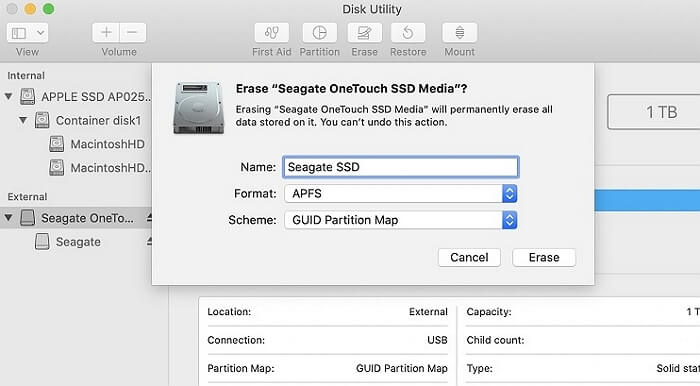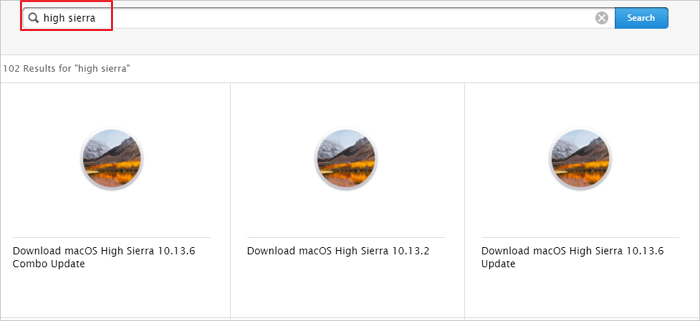Featured Articles
Although macOS released macOS Ventura in October, most people are looking for a way to download and install macOS High Sierra 10.13. The post offers you a full macOS High Sierra download and install guide and tells the changes and installation requirements for macOS High Sierra.
macOS High Sierra Overview and New Features
macOS High Sierra version 10.13 is the fourteenth version of macOS. It brings new forward-looking technologies and enhanced features to your Mac.
APFS Replaces HFS Plus
Now macOS High Sierra introduces the new Apple File System (APFS), designed to be more secure, reliable, and responsive.

Update API to Metal 2
The low-level graphics API has been updated to Metal 2, which includes machine-learning features and virtual reality.
Support High-Efficiency Video Coding (HEVC)
macOS High Sierra adds support for High-Efficiency Video Coding (HEVC) as well as High-Efficiency Image File Format (HEIF).
Other Changes
New technologies at the heart of macOS High Sierra enable more than ever to make, edit, and share 4K videos. And there are plenty of smaller improvements as well - like a redesigned emoji picker, Mail search suggestions, and Fast User Switching that doesn't require a password.
macOS High Sierra System Requirements
In order to install macOS High Sierra, your Mac must have at least 4GB of memory and 8.8GB of available storage. And the Mac device requirements are as follows:
- iMac (Late 2009 or later)
- iMac Pro (2017)
- MacBook (Late 2009 or later)
- MacBook Air (Late 2010 or later)
- MacBook Pro (Mid 2010 or later)
- Mac Mini (Mid 2010 or later)
- Mac Pro (Mid 2010 or later)
The system requirements for macOS High Sierra are relatively modest, which means that most Mac users will be able to upgrade without any issues. However, it's always a good idea to check your system requirements before upgrading to ensure everything will run smoothly.
macOS High Sierra Download (Step-by-step)
We'll introduce two available ways to help you download macOS High Sierra on a Mac. Keep reading and choose a suitable method!
How to Install macOS High Sierra with Bootable Installer
It's not difficult to install macOS High Sierra with a USB installer unless you have chosen the right tool.
We highly recommend EaseUS Data Recovery Wizard for Mac; it can automatically create a macOS bootable installer for you.
This handy feature can help you download any supported macOS versions and even the latest beta versions. Check the following guide to download and install macOS High Sierra now!
✨Step 1. Connect USB Flash Drive and Choose a macOS Version
Launch EaseUS recovery software, and choose "macOS Installer" from the Advanced Features. Insert a USB that has more than 16GB of free storage space.
- Option 1: Choose a macOS version you want to install, and a new windows will ask you to download macOS installer from App Store. After downloading the installer, click "Refresh".
- Option 2: If you have already downloaded macOS installer, choose "Add" and select the installer you have downloaded.
Finally, you can choose "Create macOS Installer" to start creating the bootable installer. You can select various macOS versions like macOS Sequoia, Sonoma, Ventura, Monterey, Big Sur, and older versions.

✨Step 2. Erase the USB and Create a macOS Installer
A notice window will appear to warn you this operation will remove everything on this USB. Make sure you have backed up data and nothing important is left on this USB, click the "Erase and create".

✨Step 3. Wait and Check How to Use macOS Installer
The software will automatically format the USB and download macOS installer files. After creating the bootable macOS installer, click the blue link on the interface to learn how to use the macOS Installer boot device to install macOS. Finally, click "Finish" to complete the whole process.

How to Download and Install macOS High Sierra from macOS Support
The easiest way to download macOS High Sierra is from macOS support. Follow the steps below to download macOS High Sierra,
Step 1. Open the downloads center for macOS.
Step 2. In the search bar, type in macOS High Sierra and select the wanted version of macOS High Sierra.

Step 3. Click the "Download" button to download the macOS High Sierra installer.

To install macOS High Sierra on your Mac, you can follow the steps below:
Step 1. Open the DMG/PKG file of macOS High Sierra and click "Continue".
Step 2. Click the "Install" button to start the Install.
Step 3. Enter the username and password to start. Wait until the process finishes.
- 4:39 Find the macOS High Sierra installer
- 4:53 Install macOS High Sierra
Additional Help: Recover Data from macOS High Sierra
During installation, your macOS data might get lost for various reasons. For example, you lose data on macOS High Sierra because of accidental deletion, formatting, and virus attack. How can you recover lost files from macOS Ventura/Monterey/Big Sur/Catalina/High Sierra? EaseUS Data Recovery Wizard for Mac is the best choice for you.
It is a powerful data recovery software that can recover lost or deleted files from your Mac, including photos, documents, emails, and more. It provides you with a lot of great features for Mac data recovery.
- Recover/restore lost, deleted, or formatted data from your Mac computer.
- Support almost all Mac systems from macOS 10.9 to macOS 13 Ventura.
- Recover data from any storage device, including hard drives, USB flash drives, and SD cards.
Download this data recovery software and recover data from macOS High Sierra.
Step 1. Search for lost files
Select the disk location to search for lost files (it can be an internal HDD/SSD or an external hard drive) where you lost data and files. Click the "Search for lost files" button.

Step 2. Go through the scanning results
This software will immediately scan your selected disk volume and display pictures, documents, audio, videos, and emails on the left pane.

Step 3. Select the file(s) and recover
Click the data to preview, and click the "Recover" button to have them back.

Conclusion
As you can see, macOS High Sierra is a powerful and valuable update worth downloading. However, before doing so, ensure your system meets the minimum requirements and take some time to back up your data, just in case. Once you've done that, follow our step-by-step download and install the macOS High Sierra guide.
And if you encounter any problems along the way, don't worry! We have a solution for that too. EaseUS Data Recovery Wizard for Mac can easily recover lost data from your internal hard drive or external storage devices. So what are you waiting for? Download macOS High Sierra today and enjoy all the new features!
macOS High Sierra Download FAQs
We have troubleshooting tips to help you if you run into any issues.
1. What is the next upgrade after High Sierra 10.13?
macOS Catalina. If running High Sierra (10.13), you can upgrade to macOS Catalina from the App Store. If you are not, you can download macOS Catalina and install it.
2. Is macOS High Sierra 10.13 the latest version?
No, the newest version is macOS 13 Ventura. Refer to what is the latest version of macOS.
3. How long does it take to download High Sierra?
If everything works correctly, the macOS High Sierra download and installation should take about 10 to 25 minutes.
Was This Page Helpful?
Dany is an editor of EaseUS who lives and works in Chengdu, China. She focuses on writing articles about data recovery on Mac devices and PCs. She is devoted to improving her writing skills and enriching her professional knowledge. Dany also enjoys reading detective novels in her spare time.
Brithny is a technology enthusiast, aiming to make readers' tech lives easy and enjoyable. She loves exploring new technologies and writing technical how-to tips. In her spare time, she loves sharing things about her game experience on Facebook or Twitter.
Related Articles
-
How to Stop Mac from Sleeping: Full Information to Prevent Mac from Sleeping
![author icon]() Dany/Feb 25, 2025
Dany/Feb 25, 2025 -
Internet Browsers Not Working after Windows Upgrade? Fix It Now!
![author icon]() Tracy King/Feb 14, 2025
Tracy King/Feb 14, 2025 -
How to Format SD Card on Chromebook [With Specific Steps]
![author icon]() Tracy King/Jan 24, 2025
Tracy King/Jan 24, 2025 -
4 Proven Ways to Fix Zsh Permission Denied in Terminal on macOS Ventura/Monterey
![author icon]() Dany/Feb 25, 2025
Dany/Feb 25, 2025